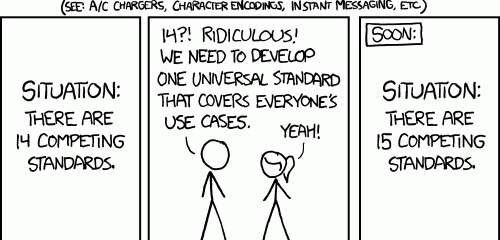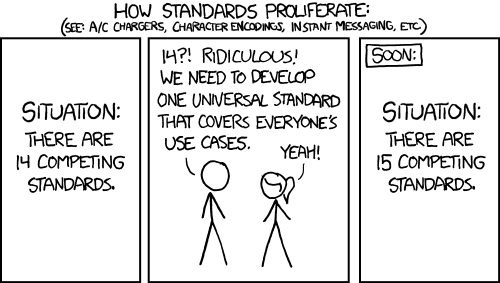Type Fight started as a project to distract Drew Roper, Ryan Pauleand Bryan Butler from their day-to-day grind. Each week they ask two designers to create the same letter and pin them against each other in the typographic ring to battle it out for best looking character.
Month: July 2012
Politically correct
Chris shared with me the link to this image. It’s funny. Sort of. It would be much funnier if it wasn’t so true.
Economic impact of open source on small business
Economic impact of open source on small business
Here are a few of the findings we derived from Bluehost data (an EIG company) and follow-on research:
- 60% of web hosting usage is by SMBs, 71% if you include non-profits. Only 22% of hosted sites are for personal use.
- WordPress is a far more important open source product than most people give it credit for. In the SMB hosting market, it is as widely used as MySQL and PHP, far ahead of Joomla and Drupal, the other leading content management systems.
- Languages commonly used by high-tech startups, such as Ruby and Python, have little usage in the SMB hosting market, which is dominated by PHP for server-side scripting and JavaScript for client-side scripting.
- Open source hosting alternatives have at least a 2:1 cost advantage relative to proprietary solutions.
Given that SMBs are widely thought to generate as much as 50% of GDP, the productivity gains to the economy as a whole that can be attributed to open source software are significant. The most important open source programs contributing to this expansion of opportunity for small businesses include Linux, Apache, MySQL, PHP, JavaScript, and WordPress. The developers of these open source projects and the communities that support them are truly unsung heroes of the economy!
Via Matt Mullenweg.
HTML5 splits into two standards
Just when web developers got a little bit of hope, Slashdot reports on the bad news.
Until now the two standards bodies working on HTML5 (WHATWG and W3C ) have cooperated. An announcement by WHATWG makes it clear that this is no longer true. WHATWG is going to work on a living standard for HTML which will continue to evolve as more technologies are added. W3C is going the traditional and much more time consuming route of creating a traditional standard which WHATWG refers to as a ‘snapshot’ of their living standard. Of course now being free of W3C’s slower methods WHATWG can accelerate the pace of introducing new technologies to HTML5. Whatever happens, the future has just become more complicated — now you have to ask yourself ‘Which HTML5?’
Even if it sounds good, it is actually really bad. HTML5 is already complicated enough, and all major browsers support a different subset of it, and even those things which are supported do differ in the way of how. Splitting the standard just complicated things further. The fact that this is not exactly new, doesn’t really matter. Saying that it won’t be harmful, is silly. As is the whole point of a “living standard”. Like a few people mentioned in Slashdot comments, “living standard” is an oxymoron. The whole point of standard is to provide a static point of reference. Splitting is not a solution to the problem. It’s quite the opposite. Consider this xkcd comics for illustration, which is nothing but the truth.
SL4A – scripting layer for Android
SL4A – scripting layer for Android
Scripting Layer for Android (SL4A) brings scripting languages to Android by allowing you to edit and execute scripts and interactive interpreters directly on the Android device. These scripts have access to many of the APIs available to full-fledged Android applications, but with a greatly simplified interface that makes it easy to get things done.
Scripts can be run interactively in a terminal, in the background, or via Locale. Python, Perl, JRuby, Lua, BeanShell, JavaScript, Tcl, and shell are currently supported, and we’re planning to add more.



